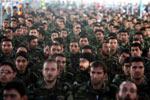 New York Times: The Obama administration on Tuesday imposed new sanctions on Iran, serving notice that it will not ease the pressure on Tehran just because it has begun talking again with the West about its nuclear program.
New York Times: The Obama administration on Tuesday imposed new sanctions on Iran, serving notice that it will not ease the pressure on Tehran just because it has begun talking again with the West about its nuclear program.
The New York Times
By MARK LANDLER
 WASHINGTON — The Obama administration on Tuesday imposed new sanctions on Iran, serving notice that it will not ease the pressure on Tehran just because it has begun talking again with the West about its nuclear program.
WASHINGTON — The Obama administration on Tuesday imposed new sanctions on Iran, serving notice that it will not ease the pressure on Tehran just because it has begun talking again with the West about its nuclear program.
The measures announced by the Treasury Department — aimed at three companies linked to the Islamic Revolutionary Guards Corps and at Iran’s national shipping line — are less important than the timing. They come two weeks after Iran held chilly talks in Geneva with the United States and other countries, which accomplished little beyond an agreement to meet again in Istanbul in late January.
The tightening of the economic vise reflects the administration’s conviction that its pressure tactics are inflicting genuine pain on Iran. It said five Iranian ships had been seized in Singapore and other ports after the Islamic Republic of Iran Shipping Lines defaulted on more than $500 million in debt.
The announcement of new sanctions, officials said, would also frustrate efforts by Iran’s government to use the prospect of further dialogue to persuade less aggressive countries to water down existing measures.
“After the Geneva talks, there was a question: ‘What is the policy of the United States and its allies going to be?’ ” said Stuart A. Levey, the under secretary of the Treasury for terrorism and financial intelligence. “It is clear that our policy is going to be to continue to impose pressure on Iran, so long as it defies its international obligations.”
The latest sanctions continue to take aim at the Revolutionary Guards, which the United States contends has taken over large sections of the Iranian economy and oversees Iran’s nuclear program.
The Treasury designated a foundation that handles the Revolutionary Guards’ investments, as well as two affiliated banks, Ansar Bank and Mehr Bank. It also designated the Moallem Insurance Company, a Tehran company that began insuring Iranian ships after they could no longer buy insurance from London-based maritime insurers.
Iran has tried to evade sanctions by creating front companies and renaming or reflagging its ships. But the lack of insurance, along with a cutoff in letters of credit and other financial services, has raised the debt burden on the national shipping line, making its ships vulnerable to seizure when they enter ports.
“All of a sudden, they have to think when they dock at any port, is this going to be safe for us?” said Adam J. Szubin, the director of the Office of Foreign Assets Control, a Treasury office that enforces economic and trade sanctions. “Today’s action, we expect, will compound those troubles.”
In the last two months, Mr. Szubin said, the Iranian shipping line defaulted on more than $500 million in loans. The five ships seized by creditors are part of a fleet of about 140. Three Iranian container ships, registered in Germany, were seized in Singapore, where they were to be auctioned off until their owners won a court stay.
There is mounting evidence that Iran’s leaders are alarmed about the sanctions, Mr. Levey said. The country has been unable to attract foreign investors to develop its oil and gas fields, and is having trouble importing refined fuel.
Publicly, Iranian officials have continued to sound defiant, saying in Geneva that they would not discuss uranium enrichment or other nuclear activities at the next meeting in Istanbul. The government has also proceeded with plans to reduce subsidies on gasoline and other basic goods, despite fears of unrest.
But American officials say the subsidies have confronted Iran with an unappealing choice: leave gasoline prices unchanged and risk having demand outstrip supply, or allow prices to soar and risk having people protest in the streets.


